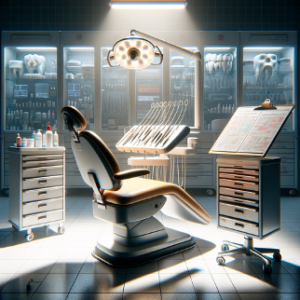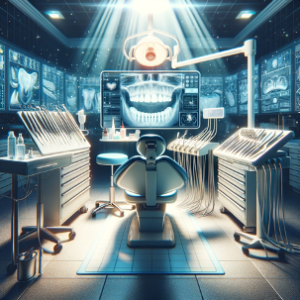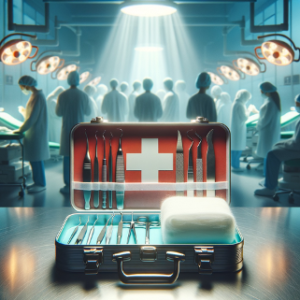Understanding Adult Dental Emergencies
A dental emergency is any situation that requires immediate dental attention to alleviate severe pain, prevent further damage, or address a potential risk to overall health. Recognizing the signs and symptoms of a dental emergency is crucial for timely intervention, which can often save teeth and alleviate distress.
Common Symptoms of Adult Dental Emergencies
- Severe Toothache: Intense pain that cannot be managed with over-the-counter pain relievers may indicate an infection, abscess, or other serious dental issues. This level of pain often necessitates immediate evaluation by a dentist.
- Swelling: Swelling in the gums, face, or jaw can signify an infection or a dental abscess. Accompanied by pain or fever, this is a critical situation that demands prompt dental care to prevent the spread of infection.
- Bleeding: Uncontrolled bleeding from the gums or following tooth extraction may indicate a complication that needs immediate attention. If bleeding does not stop within 10 minutes of applying pressure, seek professional help.
- Broken or Knocked-Out Tooth: A broken tooth that is painful or a tooth that has been completely knocked out is classified as an emergency. For a knocked-out tooth, it’s important to handle it by the crown (not the root), rinse it gently with water, and attempt to reinsert it if possible, or store it in milk until you can see a dentist.
- Lost Filling or Crown: A lost filling or crown can cause discomfort and sensitivity. While it may not seem urgent, it is important to see a dentist quickly to prevent further damage to the tooth.
- Jaw Pain or Dislocation: Severe jaw pain or a dislocated jaw can occur due to injury or dental issues. This can affect your ability to eat or speak and requires immediate evaluation.
- Abscess: An abscess is a localized infection that can appear as a swollen, painful bump on the gums and may be accompanied by a foul taste in the mouth or fever. This can be potentially life-threatening, necessitating urgent care.
Situations Requiring Immediate Attention
- Pain that interferes with daily activities
- Trauma to the mouth or face
- Sudden, uncontrollable bleeding
- Signs of infection, such as fever or swelling
In conclusion, if you are located in Ashburn, VA and experience any of these symptoms, do not hesitate to seek emergency dental care. Timely treatment can prevent complications, alleviate pain, and protect your overall health. Always consult with a dental professional to ensure appropriate care and guidance in emergencies.
Common Types of Adult Dental Emergencies
Common Types of Adult Dental Emergencies
Understanding the specific types of adult dental emergencies can help you respond effectively when faced with a dental crisis. The most frequent dental emergencies that adults may encounter include toothaches, broken teeth, knocked-out teeth, and more. Here are the details on these common emergencies, their causes, and recommended actions.
1. Toothaches
Causes: Toothaches can arise from various issues, including dental cavities, gum disease, tooth abscesses, or even sinus infections. The pain is often a sign that something is wrong beneath the surface, potentially involving infection or inflammation.
What to Do: For immediate relief, rinse your mouth with warm salt water to reduce swelling and clean any irritants. Over-the-counter pain relievers can help manage discomfort. However, it’s essential to see a dentist as soon as possible to diagnose and treat the underlying cause of the toothache.
2. Broken or Cracked Teeth
Causes: Teeth can break or crack due to a variety of factors, including trauma from accidents, biting down on hard substances, or decay that weakens the tooth structure. Even minor cracks can lead to more severe issues if left untreated.
What to Do: If you experience a broken tooth, rinse your mouth with warm water to keep the area clean. Apply a cold compress to the outside of your cheek to reduce swelling and pain. Avoid chewing on that side of your mouth. Schedule an appointment with your dentist in Ashburn, VA as soon as possible. Depending on the severity, treatment may involve dental bonding, a crown, or other restorative procedures.
3. Knocked-Out Teeth
Causes: A knocked-out tooth often results from sports injuries, falls, or accidents. If a permanent tooth is lost due to trauma, immediate action can significantly increase the chances of saving it.
What to Do: Handle the tooth only by the crown (the part that is visible in the mouth), and rinse it gently with water if it is dirty. If feasible, reinsert the tooth back into its socket. If that’s not possible, place the tooth in a container filled with milk or saline solution to keep it moist. Seek emergency dental care within 30 minutes to increase the likelihood of successful re-implantation.
4. Lost Filling or Crown
Causes: Fillings and crowns may become loose or fall out due to wear and tear, decay, or dental trauma. This can expose the tooth to sensitivity and increase the risk of further damage or infection.
What to Do: If you lose a filling or crown, keep the area clean and avoid eating on that side of your mouth. If discomfort occurs, over-the-counter pain relievers may help alleviate pain. Contact your dentist in Ashburn, VA promptly to discuss replacement options; waiting can lead to worsening decay or additional complications.
5. Abscess
Causes: Abscesses are typically caused by bacterial infections that lead to pus accumulation in the tooth or gum. They can develop from untreated cavities, gum disease, or trauma. Symptoms may include severe pain, swelling, fever, and a foul taste in the mouth.
What to Do: An abscess is a serious condition that requires immediate dental attention. Rinse your mouth with warm salt water to help alleviate pain and keep the area clean. Do not attempt to squeeze or drain the abscess yourself, as this can worsen the infection. Visit your Ashburn, VA dentist or an emergency room for treatment, which may include antibiotics or a drainage procedure.
6. Jaw Pain or Dislocation
Causes: Jaw pain can stem from various dental problems, including TMJ disorders, tooth grinding, or injury. A dislocated jaw usually results from trauma or excessive force.
What to Do: If you experience sudden jaw pain or suspect a dislocation, apply a cold compress to the jaw area to reduce swelling. Avoid chewing and keep your jaw relaxed. Seek immediate dental care or visit an emergency service for evaluation and treatment, which may involve repositioning the jaw or addressing underlying dental issues.
7. Bleeding Gums
Causes: Bleeding gums can occur due to gum disease, improper brushing techniques, or trauma from dental procedures. If bleeding is excessive or does not stop, it may indicate a more serious condition.
What to Do: If you experience bleeding, apply gentle pressure with a clean cloth or gauze to the affected area. Rinse your mouth with warm salt water to maintain cleanliness. Consult your dentist in Ashburn, VA to determine the cause of the bleeding and receive appropriate treatment.
Conclusion
Awareness of common dental emergencies and knowing how to respond can significantly impact your dental health. Always remember that timely intervention is crucial in managing these situations effectively. If you are unsure about the severity of your condition, it’s best to err on the side of caution and consult with a dental professional.
When to Seek Emergency Dental Care
Situations Requiring Immediate Attention
In addition to the common symptoms of dental emergencies, there are specific situations that necessitate urgent dental care in Ashburn, VA. Understanding when to seek help can make a significant difference in the outcome of your dental health.
- Pain that Interferes with Daily Activities: If dental pain hinders your ability to eat, sleep, or perform daily tasks, it’s essential to see a dentist right away. Chronic pain can indicate a serious underlying issue that needs immediate attention.
- Trauma to the Mouth or Face: Any injury resulting from sports, falls, or accidents that affects the teeth or jaw should prompt an immediate visit to an emergency dentist. Injuries can result in fractures, dislocations, or damage to surrounding tissues.
- Sudden, Uncontrollable Bleeding: If you experience persistent bleeding from the gums that does not subside after 10 minutes of applying pressure, or if bleeding occurs after dental surgery, you should seek immediate assistance. This may indicate a more serious complication requiring professional intervention.
- Signs of Infection: Symptoms such as fever, chills, or a swollen jaw are indicative of an infection. If accompanied by severe pain, these signs require urgent dental care to prevent the spread of infection and potential health complications.
- Difficulty Breathing or Swallowing: If you experience any difficulty in breathing or swallowing, especially related to dental issues, this is a medical emergency. It may indicate a severe allergic reaction or an infection that requires immediate attention.
- Persistent Cysts or Growths in the Mouth: Any unusual lumps, cysts, or growths that persist over time should be evaluated by a dentist. These could be benign but may also indicate more serious health issues that need to be addressed urgently.
- Severe Sensitivity: If you experience sudden and severe sensitivity to hot or cold that causes intense pain, this may indicate an exposed nerve or decay that requires immediate dental treatment.
Recognizing these signs and symptoms is vital for timely intervention. If you encounter any of these situations, do not hesitate to seek emergency dental care. Your health and well-being depend on a swift response to dental emergencies. Always consult with a dental professional to ensure appropriate care and guidance in emergencies.
Finding an Emergency Dentist in Ashburn, VA
Finding an Emergency Dentist in Ashburn, VA
When faced with a dental emergency, locating a qualified emergency dentist quickly can be crucial. Here are some effective tips and resources to help you find the right dental professional in Ashburn.
Online Directories
- Dental Association Websites: Start with websites such as the American Dental Association (ADA) or the Virginia Dental Association. These platforms have “Find a Dentist” features that allow you to search for emergency dentists in your area. You can filter by specialty, location, and availability.
- Health Insurance Provider: If you have dental insurance, check your provider’s website. Insurance companies typically have a directory of in-network dentists, which can save you money and time. Look for listings that specify emergency services.
- Online Review Platforms: Websites like Yelp, Healthgrades, and Zocdoc provide patient reviews and ratings for local dentists. Pay attention to feedback specifically about emergency care, as this can give you insight into the quality of service and patient experiences.
Local Recommendations
- Friends and Family: Reach out to friends, family, or coworkers for recommendations. Personal experiences can guide you to trustworthy dentists who are known for their emergency services.
- Community Groups: Join local online forums or community groups, such as Facebook groups or Nextdoor. Residents often share their experiences and can recommend local emergency dentists based on their own encounters.
- Local Pharmacies: Ask your pharmacist for recommendations. Pharmacists often have connections with local healthcare providers and may know which dentists offer emergency services.
Contacting Dentists
- Call Ahead: Once you have a list of potential emergency dentists, call each office to confirm their availability for emergencies. Inquire about their hours of operation, especially during weekends or holidays, when many dental offices may be closed.
- Emergency Protocol: Ask about the procedures for emergency visits. Some offices may require you to call ahead for an appointment, while others may accept walk-ins. Understanding their protocol will help you plan accordingly.
- Location and Accessibility: Consider the location of the dental office. In a dental emergency, proximity can significantly reduce travel time. Choose a dentist whose office is easy to reach and has convenient parking options.
Additional Tips
- Look For Specializations: If your dental emergency involves specific issues, such as oral surgery or pediatric care, seek out dentists with specialized training to ensure you receive the best possible treatment.
- Evaluate Payment Options: Inquire about payment plans or financing options if you do not have insurance. Some dental offices offer flexible payment solutions for emergency services.
- Check Online Presence: A professional website can provide insights into the dentist’s qualifications, services offered, and patient testimonials. Look for a well-maintained site with clear contact information and emergency services prominently displayed.
Using these resources and tips, you can efficiently find a qualified emergency dentist in Ashburn. Remember that addressing dental emergencies promptly can lead to better outcomes and alleviate discomfort.
Steps to Take Before You Arrive
Steps to Take Before You Arrive
When faced with a dental emergency, knowing the appropriate first aid measures can help manage the situation until professional treatment is available. Here are some urgent care techniques for common dental emergencies:
- Severe Toothache: Rinse your mouth with warm salt water to help reduce inflammation and discomfort. Over-the-counter pain relievers, such as ibuprofen or acetaminophen, can also be utilized to manage pain temporarily. Avoid placing aspirin directly on the gums, as this can cause chemical burns.
- Swelling: Apply a cold compress to the outside of your cheek for 15-20 minutes to help reduce swelling. If swelling is accompanied by fever or severe pain, ensure that you seek dental care immediately, as this may indicate a serious infection that requires prompt treatment.
- Bleeding: If bleeding occurs, apply gentle pressure using a clean cloth or gauze to the area for at least 10 minutes. If the bleeding persists beyond this time or is severe, seek emergency care. Avoid rinsing your mouth as this can disturb blood clots.
- Broken or Knocked-Out Tooth: For a broken tooth, rinse your mouth gently with warm water to clean the area. If you can locate any pieces of the broken tooth, keep them moist in milk or saline. For a knocked-out tooth, handle it carefully by the crown, rinse it with water, and attempt to reinsert it into the socket if possible. If reinsertion isn’t feasible, store the tooth in milk or saline until you can see a dentist.
- Lost Filling or Crown: If you lose a filling or crown, try to keep the area clean. Over-the-counter dental cement can temporarily hold the crown in place until you can see a dentist. Avoid chewing on that side of the mouth to prevent further damage.
- Jaw Pain or Dislocation: If you suspect a dislocated jaw, avoid moving your jaw excessively. You can apply a cold compress to the area to alleviate swelling and pain. It’s crucial to seek professional help as soon as possible.
- Abscess: Rinse your mouth with warm salt water to help reduce pain and draw out infection. Avoid squeezing the abscess; instead, seek dental care promptly to prevent the infection from spreading.
Following these first aid measures can help stabilize your situation until you receive professional dental treatment. Always remember, prompt action is vital in dental emergencies to secure the best possible outcome.
Aftercare and Prevention Tips
Aftercare and Prevention Tips
After experiencing a dental emergency, it is crucial to follow proper aftercare to facilitate healing and prevent further complications. Additionally, implementing preventative measures can significantly reduce the risk of future dental emergencies, ensuring optimal dental health. Here are essential aftercare and prevention tips to consider.
Post-Emergency Aftercare
- Follow Your Dentist’s Instructions: After receiving treatment, adhere strictly to the instructions provided by your dentist. This may include taking prescribed medications, applying ice to reduce swelling, or avoiding certain foods that could irritate the affected area.
- Pain Management: Over-the-counter pain relievers, such as ibuprofen or acetaminophen, can help alleviate post-treatment discomfort. However, always consult your dentist before taking any medication, especially if you are on other medications.
- Maintain Oral Hygiene: It is essential to continue brushing and flossing your teeth, but be gentle around the affected area. Use a soft-bristled toothbrush and consider rinsing with warm salt water to help keep the area clean and promote healing.
- Monitor for Complications: Keep an eye on the treated area for any signs of complications, such as increased swelling, persistent pain, or fever. If any of these symptoms arise, contact your dentist immediately to discuss your concerns.
- Dietary Adjustments: Stick to a soft diet for the first few days following your emergency treatment. Avoid hard, crunchy, or sticky foods that could exacerbate the area of concern. Gradually reintroduce solid foods as your healing progresses.
- Avoid Tobacco and Alcohol: Smoking and consuming alcohol can impede the healing process and increase the risk of complications. It is best to avoid these substances during recovery and beyond for optimal dental health.
- Schedule a Follow-Up Appointment: Your dentist may recommend a follow-up visit to assess the healing process and address any concerns. Attending this appointment is crucial for your long-term dental health.
Preventative Measures for Future Dental Emergencies
- Regular Dental Check-Ups: Schedule routine dental examinations every six months. Regular check-ups allow your dentist to identify potential issues before they escalate into emergencies, such as tooth decay or gum disease.
- Practice Good Oral Hygiene: Maintain a consistent oral care routine by brushing your teeth at least twice a day and flossing daily. Use fluoride toothpaste and mouthwash to help strengthen your enamel and reduce the risk of cavities.
- Wear a Mouthguard: If you participate in contact sports or have a tendency to grind your teeth (bruxism), consider wearing a custom-fitted mouthguard. This simple precaution can protect your teeth from trauma and prevent dental emergencies.
- Limit Sugary and Acidic Foods: A diet high in sugar and acid can lead to tooth decay and erosion. Limit the consumption of sugary snacks, sodas, and acidic fruits, and always rinse your mouth with water after consuming these foods.
- Manage Dental Issues Promptly: If you notice any signs of dental problems, such as sensitivity, discomfort, or visible decay, contact your dentist promptly. Early intervention can prevent minor issues from becoming major emergencies.
- Educate Yourself About Dental Health: Understanding the importance of dental health and being aware of the potential risks can empower you to make informed choices. Stay informed about oral health practices and encourage good habits among family members.
- Avoid Using Teeth as Tools: Using your teeth to open packages, bottle caps, or other objects can lead to chips or breaks. Always use appropriate tools for these tasks to protect your dental integrity.
- Stay Hydrated: Drinking plenty of water helps keep your mouth hydrated and can wash away food particles, reducing the risk of cavities and gum disease. Aim for at least eight glasses of water a day, and consider chewing sugar-free gum to stimulate saliva production.
By implementing these aftercare strategies and preventative measures, you can enhance your dental health and significantly reduce the risk of future dental emergencies. Maintaining a proactive approach to oral care will not only alleviate discomfort but also contribute to long-lasting health and well-being.






